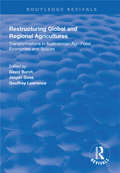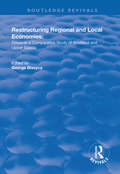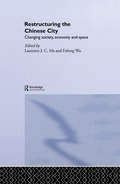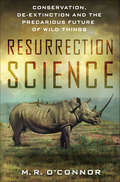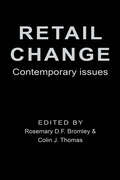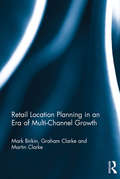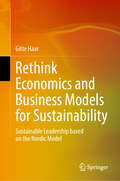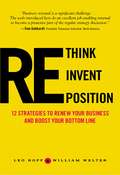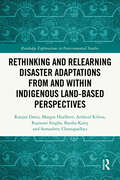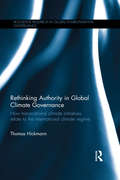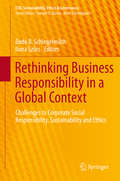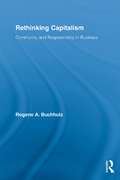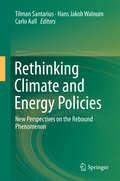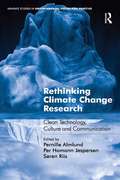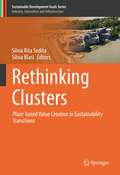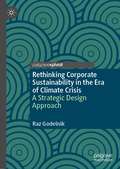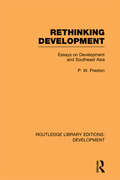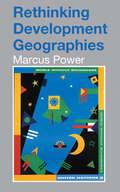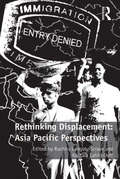- Table View
- List View
Restructuring Global and Regional Agricultures: Transformations in Australasian Agri-Food Economies and Spaces (Routledge Revivals)
by David Burch Jasper Goss Geoffrey LawrenceFirst published in 1999, this collection of papers represents the latest thinking on the effects of globalisation and agri-food restructuring from a regional and peripheral perspective. The book breaks new ground in our understanding of the relationship between the global, regional and local levels in the sphere of agri-food production. While Australia and New Zealand are important components of the agri-food system, the economic and political decisions which impact at the regional and local level are usually made elsewhere - often in the boardrooms of global companies and the political institutions of Europe and North America. At the same time, however, Australia and New Zealand have sought to establish some independent room for manoeuvre. In Australia this can be seen in the targeting of consumers in South East Asia, and New Zealand has experienced both sweeping deregulation and niche marketing of goods such as organic produce. The success or failure of these strategies cannot currently be determined, but this invaluable collection presents and discusses some possible future scenarios. Featuring 31 specialists in sociology, geography, social anthropology, veterinary science, environmental studies and sustainable development, it is a product of the Agri-Food Research Network. The volume includes 19 essays which attempt to conceptualise a series of global trends and their local ramifications, explore Australian and New Zealand experiences of agri-food restructuring in historic, ideological and discursive terms, and analyse local policy and politics and the influence on rural producers, along with studying four key concepts underpinning agri-food research and the possibilities for their application in new areas..
Restructuring Regional and Local Economies: Towards a Comparative Study of Scotland and Upper Silesia (Urban And Regional Planning And Development Ser.)
by George BlazycaThis title was first published in 2003. Throughout Western Europe and the former Soviet bloc, the structural shift from traditional heavy industry towards lighter manufacturing and services has often had a strong regional dimension. This volume brings together researchers and practitioners from Scotland and Poland to share such restructuring experiences. The Poles, now closer than ever to EU membership, are eager to draw on Western experience while Western experts and institutions have an opportunity to contribute to shaping regional policy in Central Europe. The book is divided into four sections: the first examines economic transformation and restructuring; the second focuses on social partnerships and their role in regional development; the third looks at enterprise-supporting initiatives; the final section questions the role of FDI. Its Scottish-Polish focus provides a fresh perspective on policy for regional and local development, summarising recent developments in both countries and stressing the importance of building appropriate institutional capacity to promote strong local economies.
Restructuring the Chinese City: Changing Society, Economy and Space
by Fulong Wu Laurence J.C. MaA sea of change has occurred in China since the 1978 economic reforms. Bringing together the work of leading scholars specializing in urban China, this book examines what has happened to the Chinese city undergoing multiple transformations during the reform era, with an emphasis on new processes of urban formation and the consequent reconstituted urban spaces. With arguments against the convergence thesis that sees cities everywhere becoming more Western in form and suggestions that the Chinese city is best seen as a multiplex city, Restructuring the Chinese City is an indispensable text for Chinese specialists, urban scholars and advanced students in urban geography, urban planning and China studies.
Resurrection Science: Conservation, De-Extinction and the Precarious Future of Wild Things
by M. R. O'Connor**A Library Journal Best Book of 2015 ****A Christian Science Monitor Top Ten Book of September**In a world dominated by people and rapid climate change, species large and small are increasingly vulnerable to extinction. In Resurrection Science, journalist M. R. O'Connor explores the extreme measures scientists are taking to try and save them, from captive breeding and genetic management to de-extinction. Paradoxically, the more we intervene to save species, the less wild they often become. In stories of sixteenth-century galleon excavations, panther-tracking in Florida swamps, ancient African rainforests, Neanderthal tool-making, and cryogenic DNA banks, O'Connor investigates the philosophical questions of an age in which we "play god" with earth's biodiversity. Each chapter in this beautifully written book focuses on a unique species--from the charismatic northern white rhinoceros to the infamous passenger pigeon--and the people entwined in the animals' fates. Incorporating natural history and evolutionary biology with conversations with eminent ethicists, O'Connor's narrative goes to the heart of the human enterprise: What should we preserve of wilderness as we hurtle toward a future in which technology is present in nearly every aspect of our lives? How can we co-exist with species when our existence and their survival appear to be pitted against one another?
Retail Change: Contemporary Issues
by Rosemary D.F. Bromley Colin J. ThomasThe economic, social and environmental implications of recent changes in retailing constitute significant contemporary issues, which are the focus of this timely book. Retail change deals with the internationalization of retailing, the development of shopping centres in the city and at suburban sites, and the growth of leisure shopping. It provides an up-to-date review of the central questions faced by undergraduate students in planning, business studies and geography. The retail environment of developed economies has undergone revolutionary change since the 1970s, and the process is far from over. In the book the major elements central to contemporary retail change are developed across the whole spectrum of spatial scales relevant to present-day society. The first part adopts an economic perspective and focuses on the process of business concentration and its increasingly international orientation. This is followed by analyses of change in the urban region, concentrating on the emergence of the great variety of new retail forms associated with retail decentralization. The planning implications of retail change are developed in the third part. The future of the city-centre and other traditional shopping centres is examined in the light of challenges presented by new facilities. Alternative future scenarios contingent upon laisser-faire or interventionist government policy controls are also discussed. The social implications of retail change are developed in the final section. All students and researchers concerned with the evolution and development of the retail sector of advanced economies will welcome this book as an authoritative source of contemporary findings and commentary. Rosemary D. Bromley and Colin J. Thomas are Lecturers in Geography at the University College of Swansea, Wales.. This book is intended for undergraduate students taking courses in economic geography and retailing in departments of geography, business studies, planning, etc.
Retail Impact Assessment: A Guide to Best Practice
by John EnglandThis book reviews the methodology and emphasises a recommended best practice approach to the application of retail impact assessment. It is a valuable guide for planners and surveyors, new and experienced professionals, and students studying retail planning.
Retail Location Planning in an Era of Multi-Channel Growth
by Mark Birkin Graham Clarke Martin ClarkeThe way in which products and services are delivered to consumers, through branches and retail outlets, or more generally through a network of distribution channels, remains fundamentally important for maintaining a competitive advantage for a very wide range of businesses. This is true within domestic markets, but especially so for increasingly global corporations, as shareholder pressure for continued growth drives businesses into ever more widespread geographical markets. Arguing that more complex markets demand more sophisticated spatial analysis, this book discusses the application of location planning techniques to generate competitive advantage in a variety of business sectors in a changing retail environment. The series of techniques are analysed, from relatively straightforward branch scorecards to sophisticated applications of geographical information systems (GIS), spatial modelling and mathematical optimisation. Also explored are the changing dynamics of the impact of more restrictive planning environments in many countries on how retailers find new locations for growth and respond to changing consumer needs and wants. The book is essential reading for students and scholars alike working in geography, economics, business management, planning, finance and industry studies.
Rethink Economics and Business Models for Sustainability: Sustainable Leadership based on the Nordic Model
by Gitte HaarThe overall framework for leaders is now changing and a reassessment of traditional economic and financial models is called for to foster the green and circular transition. The Nordic countries may offer some of the values and leadership trends needed to implement sustainable leadership. Sustainable leadership is necessary to attract new generations of customers and employees, and to drive the great transition to a green economy. Leaders need new competences and new values to prepare their companies for the new market conditions and geopolitical situation. Managing businesses’ impacts throughout the value chain is the new normal and sustainability is a business imperative. In this regard, the Sustainable Development Goals can offer guidance. The Nordic societies have proven to be forerunners in terms of developing SDG-oriented business strategies, and their economies remained resilient and stable through the financial crisis and the COVID-19 pandemic. Using the Nordic example, this book discusses how the transformation of business models, organizations, and societies, as well as the pricing of externalities, will be essential to operating within the boundaries of a fair and sustainable world. The book introduces a UN SDG Fund and explains the value of sending executives on “Højskole” – a Danish journey of lifelong learning and the continuous acquisition of new leadership skills and values. In addition, it presents the new concepts of the “Strategic House” and “Purpose Gap,” while adapting Porter’s value chain into a Circular Organization Model. The book also features a catalogue of proven methods and guidelines to assist companies in transforming their businesses towards sustainability, ESG, and regenerative impacts.
Rethink, Reinvent, Reposition: 12 Strategies to Make Over Your Business
by Leo HopfIs your business struggling to stay afloat? Are you overwhelmed by the challenge of building an organization that can be a market leader? Well, now is the time to stop going in circles-find a new direction and re-imagine your company. In this hard-hitting guide, renowned international corporate consultants and professors Leo Hopf and William Welter show how to breathe new life into your firm.Using revealing case studies from Seagate to Harley-Davidson, they offer such key strategies as:Repackaging products to widen the range of your target demographicRevising your profit model to improve your marginsMoving up- or down-market to attract new customersUsing core competencies to enter new marketsConducting business at a different time to reach new customers You'll need to take a risk to reap the rewards. But this blueprint for growth will supply you with the confidence to start on a different path. So forget the same-old tired tactics. Instead, make things happen by making over your business! It's crucial to the livelihood of your enterprise, and Hopf and Welter give you everything you need to get it right.
Rethink, Reinvent, Reposition
by Leo Hopf William WelterIs your business struggling to stay afloat? Are you overwhelmed by the challenge of building an organization that can be a market leader? Well, now is the time to stop going in circles-find a new direction and re-imagine your company. In this hard-hitting guide, renowned international corporate consultants and professors Leo Hopf and William Welter show how to breathe new life into your firm. Using revealing case studies from Seagate to Harley-Davidson, they offer such key strategies as:Repackaging products to widen the range of your target demographic Revising your profit model to improve your margins Moving up- or down-market to attract new customers Using core competencies to enter new markets Conducting business at a different time to reach new customers You'll need to take a risk to reap the rewards. But this blueprint for growth will supply you with the confidence to start on a different path. So forget the same-old tired tactics. Instead, make things happen by making over your business! It's crucial to the livelihood of your enterprise, and Hopf and Welter give you everything you need to get it right.
Rethink, Reinvent, Reposition
by William Welter Leo HopfIs your business struggling to stay afloat? Are you overwhelmed by the challenge of building an organization that can be a market leader? Well, now is the time to stop going in circles-find a new direction and re-imagine your company. In this hard-hitting guide, renowned international corporate consultants and professors Leo Hopf and William Welter show how to breathe new life into your firm. Using revealing case studies from Seagate to Harley-Davidson, they offer such key strategies as:Repackaging products to widen the range of your target demographic Revising your profit model to improve your margins Moving up- or down-market to attract new customers Using core competencies to enter new markets Conducting business at a different time to reach new customers You'll need to take a risk to reap the rewards. But this blueprint for growth will supply you with the confidence to start on a different path. So forget the same-old tired tactics. Instead, make things happen by making over your business! It's crucial to the livelihood of your enterprise, and Hopf and Welter give you everything you need to get it right.
Rethinking and Relearning Disaster Adaptations from and within Indigenous Land-Based Perspectives (Routledge Explorations in Environmental Studies)
by Ranjan Datta Margot Hurlbert Arifatul Kibria Rajmoni Singha Barsha Kairy Somashree ChattapadhyaThis book offers a critical exploration into Indigenous knowledge systems, particularly focusing on Indigenous land-based knowledge and practice in reshaping disaster adaptations.Drawing from Indigenous communities in Bangladesh, this book challenges transformational approaches to disaster resilience by centering on land-based perspectives intrinsic to Indigenous cultures. The book showcases how Indigenous and land-based minority communities in Bangladesh have historically coped with and adapted to environmental challenges. It navigates beyond the Eurocentric paradigm, acknowledging the richness of traditional Indigenous land-based knowledge and practice embedded in the relationship between Indigenous peoples, land-based minority communities, and their natural environments. The book focuses on the interconnectedness of Indigenous land-based knowledge, culture, and sustainable practices, providing a blueprint for rethinking contemporary disaster adaptation strategies. By relearning from Indigenous land-based perspectives, readers gain invaluable insights into holistic, community-based approaches prioritizing harmony with nature over technological fixes. Through Indigenist, decolonial, relational, and feminist theoretical research frameworks, the book advocates for a paradigm shift in disaster management, emphasizing the importance of respecting and integrating Indigenous land-based solutions.Rethinking and Relearning Disaster Adaptations from and within Indigenous Land-Based Perspectives emerges as a crucial resource for scholars, policymakers, and practitioners seeking to foster resilience through a more inclusive and culturally sensitive lens.
Rethinking Authority in Global Climate Governance: How transnational climate initiatives relate to the international climate regime (Routledge Research in Global Environmental Governance)
by Thomas HickmannIn the past few years, numerous authors have highlighted the emergence of transnational climate initiatives, such as city networks, private certification schemes, and business self-regulation in the policy domain of climate change. While these transnational governance arrangements can surely contribute to solving the problem of climate change, their development by different types of sub- and non-state actors does not imply a weakening of the intergovernmental level. On the contrary, many transnational climate initiatives use the international climate regime as a point of reference and have adopted various rules and procedures from international agreements. Rethinking Authority in Global Climate Governance puts forward this argument and expands upon it, using case studies which suggest that the effective operation of transnational climate initiatives strongly relies on the existence of an international regulatory framework created by nation-states. Thus, this book emphasizes the centrality of the intergovernmental process clustered around the United Nations Framework Convention on Climate Change (UNFCCC) and underscores that multilateral treaty-making continues to be more important than many scholars and policy-makers suppose. This book will be of great interest to students and scholars of global environmental politics, climate change and sustainable development.
Rethinking Business Responsibility in a Global Context: Challenges to Corporate Social Responsibility, Sustainability and Ethics (CSR, Sustainability, Ethics & Governance)
by Bodo B. Schlegelmilch Ilona SzőcsThis book examines topical issues in global corporate social responsibility (CSR) from both scholarly and practical perspectives. It offers a variety of viewpoints and cases from countries around the globe and combines them with current academic knowledge. Intended for students, academics, and managers wishing to keep abreast of the challenges and opportunities for corporations operating in our ever-more-complex globalized world, this book provides fresh insights into responsible business conduct.
Rethinking Capitalism: Community and Responsibility in Business (Routledge Studies in Business Ethics)
by Rogene BuchholzGiven the recent financial meltdown and continuing economic problems the country and the world are facing, Rethinking Capitalism is particularly relevant. With the government having bailed out banks and other financial institutions as well as automobile companies, and anger over the compensation and severance packages provided to the managers of failed institutions in light of growing inequalities and continued high unemployment in American society, many are wondering if self-interest driven free-market capitalism is still viable. While there is some support for more active government regulation of financial and other institutions, there is also significant opposition to such an approach as new political movements gain strength. Are there other alternatives to create a more responsible capitalism that serves the entire society? Rethinking Capitalism questions the individualistic assumptions of a capitalist society and offers a new way to understand capitalism that entails a new role for business based on community and responsibility. Using classical American Pragmatism as a philosophical framework for capitalism, Professor Buchholz analyzes the history of capitalistic thought and proposes that we recast management as a profession akin to law and medicine oriented toward serving the public rather than just maximization of shareholder wealth. Buchholz challenges the way we understand capitalism with its emphasis on the creation of economic wealth and growth to the exclusion of other important goals and champions a new approach to the creation of a more sustainable and responsible functioning of the capitalistic system, the corporate organization, and its management.
Rethinking China's Provinces
by John FitzgeraldThis is the third volume in a series examining the political importance of China's provinces under reform. The present book provides a survey of provinces as echelons of the peoples Republic of China. It seeks to locate the province as an administrative level in the Chinese state, through an examination of history, economic, social and political developments of these units. By situating the province history, this volume identifies new developments in the territorial administration of the People's Republic over the reform era. It also charts the consequent emergence of the city as an intermediate unit, situated between the province and the country, and providing challenges to the hierarchy of the bureaucratic state. This book includes detailed analyses of Chongqing, Henan, Guangdong, Anhui, Yunnan and Heilongjiang. It contains extensively researched empirical data collected from these provinces, and user friendly maps of these regions.
Rethinking Climate and Energy Policies
by Tilman Santarius Hans Jakob Walnum Carlo AallThis book calls for rethinking current climate, energy and sustainability policy-making by presenting new insights into the rebound phenomenon; i. e. , the driving forces, mechanisms and extent of rebound effects and potential means of mitigating them. It pursues an innovative and novel approach to the political and scientific rebound discourse and hence, supplements the current state-of-knowledge discussed in the field of energy economics and recent reports by the Intergovernmental Panel on Climate Change. Building on central rebound publications from the past four decades, this book is divided into three main sections: Part I highlights new aspects of rebound economics by presenting insights into issues that have so far not been satisfactorily researched, such as rebounds in countries of the Global South, rebounds on the producer-side, and rebounds from sufficiency behaviour (as opposed to rebounds from technical efficiency improvements). In turn, Part II goes beyond conventional economic rebound research, exploring multidisciplinary perspectives on the phenomenon, in particular from the fields of psychology and sociology. Advancing such multidisciplinary perspectives delivers a more comprehensive understanding of rebound's driving forces, mechanisms, and policy options. Part III puts rebounds into practice and presents several policy cases and sector-specific approaches, including the contexts of labour markets, urban planning, tourism, information and communication technologies, and transport. Lastly, the book embeds the issue into the larger debate on decoupling, green growth and degrowth, and identifies key lessons learned for sustainable development strategies and policies at large. By employing such varied and in-depth analyses, the book makes an essential contribution to the discussion of the overall question: Can resource-, energy-use and greenhouse gas emissions be substantially reduced without hindering economic growth?
Rethinking Climate Change Research: Clean Technology, Culture and Communication (Routledge Studies in Environmental Policy and Practice)
by Pernille AlmlundThe problems and debates surrounding climate change possess closely intertwined social and scientific aspects. This book highlights the importance of researching climate change through a multi-disciplinary approach; namely through cultural studies, communication studies, and clean-technology studies. These three dimensions taken together have the ability to constitute a positive agenda for climate change science in its broader understanding. To cope with the climate change challenge, not only do we need new energy efficient technologies, other ways of living, and new ways to communicate but we especially need new ways to start thinking about climate change across disciplines and backgrounds. We need to begin thinking across engineering, cultural science and communication in order to create innovative solutions, as well as to generate optimistic and progressive narratives about the future. Accentuating these 'softer' scientific disciplines, their overlaps, and the positive discourses they can create, this book provides some more profoundly researched themes pertaining to climate change and by that, strengthening the analytical as well as the integrative approaches toward the fundamental questions at stake.
Rethinking Clusters: Place-based Value Creation in Sustainability Transitions (Sustainable Development Goals Series)
by Silvia Rita Sedita Silvia BlasiThis volume discusses how different geographical spaces can enhance or hinder the capacity of a variety of organizational settings to achieve economic value creation in the pursuit of sustainable regional development. In order to provide the most comprehensive picture of new sources of value creation for sustainable transitions, the book collects contributions that tackle this issue from a variety of perspectives, and adopts a systemic approach where macro, meso and micro-levels of analysis are intertwined in three sections. This multidisciplinary and interdisciplinary approach comes from scholars operating in the fields of planning, economic geography, social entrepreneurship and organizational management. The first section of the book adopts a macro-level approach linking sustainability to the regional development theme, and addresses how organizations work between different social interests to produce outcomes not previously realized. The second section of the book focuses on the spatial dimensions of sustainable development, with particular clusters, industrial districts and regions considered as relevant units of analysis (meso-level analysis). The third section of the book is dedicated to a micro-level approach, illustrating how to drive social entrepreneurship activities, which are based upon sustainable business models centered in the creation of a shared value. The book is geared towards scholars working on sustainable development issues intersecting the disciplines of regional studies, economic geography and management, and will appeal to geographers and researchers in economic development, business innovation, and sustainability transitions.
Rethinking Corporate Sustainability in the Era of Climate Crisis: A Strategic Design Approach
by Raz GodelnikThis book provides a clear, critical, and timely analysis of the state of corporate sustainability within the context of the climate crisis. It offers not only a substantive critique of the current efforts but also clarity about the changes needed and how to implement them. The book goes beyond the more common debate on shareholder capitalism vs. stakeholder capitalism to explain the shortcomings of the current approach to sustainability in business, which the author describes as sustainability-as-usual. Using strategic design lenses, the author proposes a new model of awakened sustainability, which offers a transformational shift in corporate sustainability to ensure companies fairly and effectively address the climate crisis. The book presents the numerous changes needed in the environment in which companies operate to enable awakened sustainability and how these changes can be realized. Grounded in the scientific community’s calls for urgent action on climate change, this groundbreaking text provides scholars with an evaluation of current and future trends in corporate sustainability. It connects the dots between the progress made in the last five decades and the opportunities entailed in the work on a regenerative and just vision for companies in this decade and beyond.
Rethinking Creative Cities Policy: Invisible Agents and Hidden Protagonists
by Allan Watson and Calvin TaylorIn recent years, there has been high level of interest amongst policy-makers in the ‘creative city’ concept, due to the anticipation of economic and social benefits from a growing cultural and creative economy. However, a lack of understanding of local social and economic contexts, as well as the complexities and challenges of cultural production, has resulted in formulaic, ineffective misguided policies. This book is concerned, in various ways, with developing an understanding of the complex dimensions of cultural production, and with tackling the often weak and implied links between research, policy and urban planning. In particular, contributors are concerned with agents, protagonists and practices that appear to be somehow invisible to, hidden from, or indeed ignored in much contemporary creative cities policy. Drawing on case studies from the UK and the Netherlands, chapters consider creative industries and policy across a range of scales, from provincial cities and regional economies, to the global cities of London and Amsterdam. This book was originally published as a special issue of European Planning Studies.
Rethinking Darkness: Cultures, Histories, Practices (Ambiances, Atmospheres and Sensory Experiences of Spaces)
by Nick Dunn and Tim EdensorThis book examines the concept of darkness through a range of cultures, histories, practices and experiences. It engages with darkness beyond its binary positioning against light to advance a critical understanding of the ways in which darkness can be experienced, practised and conceptualised. Humans have fundamental relationships with light and dark that shape their regular social patterns and rhythms, enabling them to make sense of the world. This book ‘throws light’ on the neglect of these social patterns to emphasize how the diverse values, meanings and influences of darkness have been rarely considered. It also examines the history of our relationship with the dark and highlights how normative attitudes towards it have emerged, while also emphasising its cultural complexity by considering a contemporary range of alternative experiences and practices. Challenging notions of darkness as negative, as the antithesis of illumination and enlightenment, this book explores the rich potential of darkness to stimulate our senses and deepen our understandings of different spaces, cultural experiences and creative engagements. Offering a rich exploration of an emergent field of study across the social sciences and humanities, this book will be useful for academics and students of cultural and media studies, design, geography, history, sociology and theatre who seek to investigate the creative, cultural and social dimensions of darkness.
Rethinking Development: Essays on Development and Southeast Asia (Routledge Library Editions: Development)
by Peter PrestonFirst published in 1987, this volume stresses the importance of development studies for sociology, as P. W. Preston argues that this field of study is emerging from the technical social scientific ghetto back into the mainstream of the ‘classical tradition’ of social theorizing, represented by Marx, Weber and Durkheim. Preston discusses the position of development studies in relation to the wider group of the social sciences in general and to sociology in particular. Using examples mainly from the study of Southeast Asia, he looks at the diversity of available ‘modes of social theoretic engagement’ and considers the work of the colonial administrator scholar, the humanist academic scholar, and the scholar who theorises on behalf of the planners, discusses the mode of political writing, and Marxian analyses of development; and considers the particular problems surrounding the elites of post-colonial ‘nation states’.
Rethinking Development Geographies
by Marcus PowerDevelopment as a concept is notoriously imprecise, vague and presumptuous. Struggles over the meaning of this fiercely contested term have had profound implications on the destinies of people and places across the globe. Rethinking Development Geographies offers a stimulating and critical introduction to the study of geography and development. In doing so, it sets out to explore the spatiality of development thinking and practices. The book highlights the geopolitical nature of development and its origins in Empire and the Cold War. It also reflects critically on the historical engagement of geographers with 'the Tropics', the 'Third World' and the 'South'. The dominant economic and political philosophies that shape the policies and perspectives of major institutions are discussed. The interconnections between globalization and development are highlighted through an examination of local, national and transnational resistance to various forms of development.The text provides an accessible introduction to the complex and confusing world of contemporary global development. Informative diagrams, cartoons and case studies are used throughout. While exploring global geographies of economic and political change Rethinking Development Geographies is also grounded in a concern with people and places, the 'view from below', the views of women and the view from the 'South'.
Rethinking Displacement: Asia Pacific Perspectives
by Ruchira Ganguly-Scrase Kuntala Lahiri-DuttThis book responds to the need to explore the multitude of interconnected factors causing displacements that compel people to move within their homelands or traverse various borders in the contemporary world that is characterised by extensive and rapid movements of people. It addresses this need by bringing together historical and contemporary accounts and critical examinations of the displaced, by articulating the commonalities in their lived experiences. It accomplishes the task of charting a new path in displacement studies by offering a number of studies from interdisciplinary and diverse methodological approaches comprising ethnographic and qualitative research and literary interpretations to emphasise that although the forms and conditions of mobility are highly divergent, individual experiences of displacement and placelessness offer a critical challenge to the artificial categorisations of people's movements. Each chapter adds insights into the different configurations of displacement and placement, and offers fresh interpretations of migration and dislocation in today's rapidly changing world. The contributors critically examine a variety of displacement processes and experiences in the context of war, tourism, neoliberal policies of development, and the impact of various agro-forestry policies. They focus on a range of countries, enabling a thorough comparative analysis in terms of scope and range of examples and methods of analysis. This book makes an original contribution to the growing body of literature on displacement, and will appeal to a wide readership including advanced undergraduates, and graduate students and professors in disciplines such as human geography, development studies, sociology and anthropology, regional studies and comparative impact assessment.
